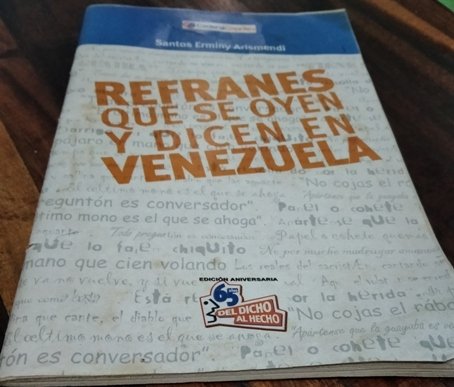[ESP/ENGL] Cinco sabios refranes venezolanos (Número 52)


Este dicho es muy cierto, ya que la luz solar es la más benéfica para todos los seres vivos, ya que brinda salud y energía; por lo que recibir rayos solares podría decirse que es una práctica profiláctica, evitando de este modo ciertas enfermedades. Es un refrán muy usado por las abuelitas, y que busca resaltar la importancia que tiene el Astro Rey para la salud humana, ya que si no se requiere doctor, es porque el cuerpo está sano.
Si analizamos este refrán, el mismo indica que la entrada o comienzo es por un sitio si se quiere inferior, marginal (el albañal), y que al salir de la situación (podría decirse trabajo, relación, etc.), se sale por una parte importante, principal, (el portón), por lo que puede deducirse que en el lapso de tiempo en el que se estuvo en ese sitio, vínculo o evento específico, se mejoró la condición, hubo progreso y superación. Es un dicho que puede comprobarse al observar la trayectoria de ciertas personas.
Esta es una forma muy folklórica de mandar al diablo o al cuerno a la gente. Un bachaco es una hormiga grande, cortadora de hojas, por lo que desearle a alguien que le pique el bachaco, no es desear algo grato, pues su picada es bien urticante y dolorosa.
Este refrán resalta el valor de la experiencia, como también de que al transcurrir la vida, el tiempo, al vivir, se pueden anticipar las cosas buenas y malas; sin embargo, es muy común que la gente no preste atención a estos avisos, y entonces, aprende a los golpes.
Murmurar en este caso, se refiere a entrometerse en la vida ajena, a chismear, a calumniar al prójimo; y muchas veces quienes tienen ese mal hábito, lo hacen sin percatarse que cometen peores errores que aquellos que critican, o también lo hacen intencionalmente para desviar la atención de los errores propios. Hay personas en este mundo que no brillan por mérito propio, sino por malponer y desprestigiar a los demás, eso es lamentable…



This saying is very true, since sunlight is the most beneficial for all living beings, since it provides health and energy; so receiving sun rays could be said to be a prophylactic practice, thus avoiding certain diseases. It is a saying widely used by grandmothers, and that seeks to highlight the importance of the sun for human health, since if a doctor is not required, it is because the body is healthy.
If we analyze this saying, it indicates that the entrance or beginning is through a place, if you want, inferior, marginal (the sewer), and that when leaving the situation (it could be said job, relationship, etc.), one exits through a important, main part, (the gate), so it can be deduced that in the period of time in which it was in that site, link or specific event, the condition improved, there was progress and improvement. It is a saying that can be verified by observing the trajectory of certain people.
This is a very folkloric way of telling people to go to hell. A bachaco is a large, leaf-cutter ant, so wishing someone to be bitten by the bachaco is not wishing something pleasant, because its bite is very stinging and painful.
This proverb highlights the value of experience, as well as the fact that as life passes, time, when living, good and bad things can be anticipated; however, it is very common for people not to pay attention to these warnings, and so they learn the hard way.
Murmuring in this case refers to meddling in the life of others, gossiping, slandering others; And many times those who have this bad habit do it without realizing that they make worse mistakes than those who criticize, or they also do it intentionally to divert attention from their own mistakes. There are people in this world who don't shine on their own merit, but because they discredit others, that's unfortunate...
.png)
Dear readers, here is the link to the previous issue, in case you want to read it:
Víctor Vera Morales. (Agosto 2004). Refranes y Comidas de Venezuela. Editado por el Instituto Municipal de Publicaciones de la Alcaldía de Caracas.
Santos Erminy Arismendi. (2006). Refranes que se oyen y dicen en Venezuela. Cadena Capriles, Caracas. Venezuela.
- Fotos de mi autoría, tomada con un teléfono REDMI 8A, intervenida con WordArt / Photos of my authorship, taken with a REDMI 8A telephone, intervened with WordArt.
- Los diseños incluidos en esta publicación, han sido elaborados por mi persona con la aplicación CANVA / The designs included in this publication has been made by me with the CANVA application.
In the event that it is required to use the content or images of this post and my other publications, I would be grateful if my authorship (Fabiola Martínez) was made and the corresponding link was cited. Thank you.

 Delegations welcome!
Delegations welcome!


Saludos @sirenahippie, has traído una gran selección de refranes, primera vez que los leo a cada uno, la sabiduría ancestral es una fuente de conocimiento que permanece en el tiempo, me gustó el número 5, es muy parecido al que dice "mono no se ver su rabo solo el de los demás" para referirse a la situación de personas que les gusta criticar la vida ajena y su actuar es peor que la persona a la que critican.
El número 3 está genial, que pique un bachaco duele ja, ja, ja; no entiendo de donde sacan fuerza estos animales, gracia por compartir parte de nuestro acervo.
Feliz y bendecida noche!
Hola @belkyscabrera, lamento pasar tan tarde a responder tu estupendo comentario. Es cierto lo que dices, los refranes tienen mucha sabiduría, mucho contenido que debe conocerse y aprovecharse. Me encanta que te gusten los refranes, ese del mono está genial. Un gran saludo y feliz Navidad.